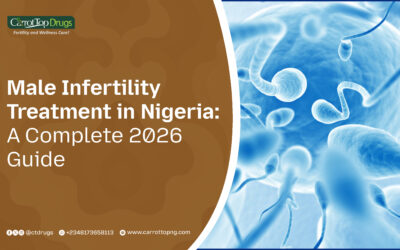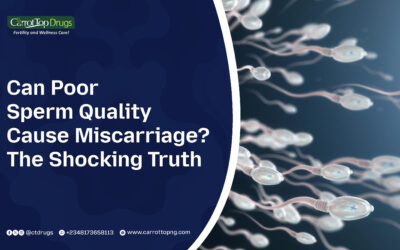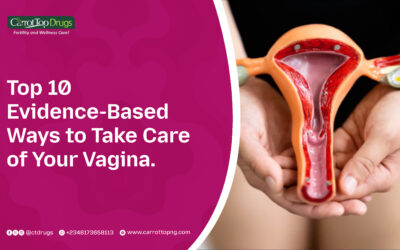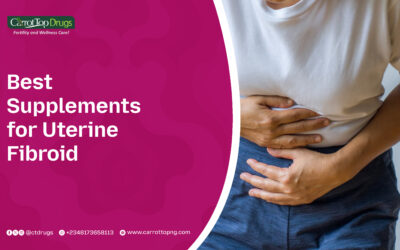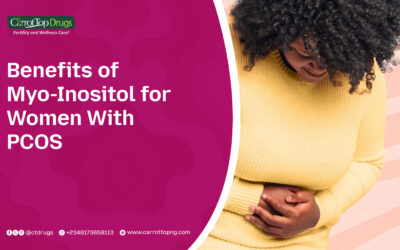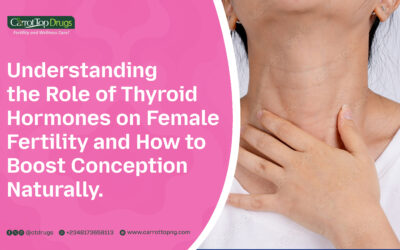What are ovarian cysts?
Ovarian cysts are fluid-filled sacs that may occur in either one or both of the ovaries.
In a woman, the ovaries play a very vital role of;
- Producing hormones like progesterone and estrogen
- Producing the female sex cell (the egg)
Fertility is not possible without these two functions of the ovaries in the woman.
What are the types of Ovarian Cysts?
There are several types of Ovarian cysts. Usually, you could have the cysts and not even know because they are very small and benign. In addition to not knowing, you could have no symptoms whatsoever. This type of ovarian cyst does not really affect a woman’s fertility.
Let’s examine some of the types then:
Functional Cysts
When you hear of ovarian cysts, the most common type is a functional cyst. It is not related to any disease whatsoever. They usually occur because of ovulation.
This type of cyst usually shrinks on its own without treatment in less than 2 months.
Follicular Cyst
What is a follicle?
Let’s use the example of an egg to describe its function. As a shell is to an egg so is a follicle to an ovum. In other words, the follicle is found in the ovary as well. But, it covers the egg and ruptures (opens up) during your ovulation to release the egg.
On rare occasions, this type of cyst forms when the follicle fails to release its egg. Then, the follicle gets bigger because of the presence of fluid.
Corpus Luteum Cyst
In order to explain this as simply as possible, you need to know what corpus luteum is.
Previously, we described a follicle. Corpus luteum is that follicle after it has released the egg that grows to form a clump of cells that produces hormones. When a fluid collects in this clump it forms a cyst, that kind of cyst is called a corpus luteum cyst.
Cystadenomas
These types of cysts form on the surface of your ovary. The type of fluid they contain may vary. Some may be watery, while others are thicker.
Endometriomas
These cysts are linked to endometriosis. These cysts contain endometrial tissues. The endometrial tissue is from the lining of your womb (uterus) which at menstrual comes out with your menstrual flow.
Polycystic Ovarian Syndrome
This is commonly known as PCOS. It is a medical condition characterized by the elevation of androgen in women. This may be with the presence of multiple cysts. However, there are cases where PCOS exists without the presence of multiple ovarian cysts. PCOS is a major cause of infertility in women.
What are the factors that predispose you to have an ovarian cyst?
Some of these factors are:
Pregnancy Status
They are more common in pregnant women.
Age
Premenopausal women (women who are close to reaching menopause) are more likely to have an ovarian cyst.
History
If a woman in your family has had ovarian cysts, there is a higher chance that you would also have them.
Medical Conditions
You’re more likely to have ovarian cysts if you have polycystic ovary syndrome (PCOS), endometriosis, or other medical conditions.
How Common Is Ovarian Cyst In Women?
Ovarian cysts are common in women. However, they are mostly functional ovarian cysts that really do not affect the woman’s fertility negatively. It is estimated that 10 out of every 100 women have ovarian cysts. They are mostly benign and may not cause any problems. However, they could also have some complications.
How Serious Are Ovarian Cysts?
In most cases, not serious at all. In fact, they just leave before you are aware of anything.
However, very rare cases of ovarian cysts can cause complications such as infertility or cancer.
What are the causes of Ovarian Cysts?
What causes ovarian cysts? In most cases, since functional ovarian cysts are the most common types, ovulation is the cause of ovarian cysts.
In simpler terms, the reason why most women have ovarian cysts is because they ovulate. The body typically resolves these cases on its own. Though it’s very good to do a pelvic scan just to make sure that everything is fine down there.
Other causes of Ovarian Cysts are:
Endometriosis
When endometriosis develops in the body, it may result in the formation of Ovarian cysts.
Pelvic Inflammatory Disease (PID)
This could spread all the way to your ovaries and result in the formation of cysts.
Abnormality in the cell production process
This is the cause of dermoid cysts and cystadenoma formation.
Symptoms of Ovarian Cysts
You may not have a symptom of an ovarian cyst if you have small, simple, or benign ovarian cyst — functional cysts.
But, in the case that you have endometriomas, then you may experience the following…
- Pain especially in your back
- Pain during or after sex
- Painful periods
- Bloating
In the case that you have polycystic ovary syndrome, you could experience
- Irregularities in periods
- Difficulty losing weight
- Increased body hair growth
So mainly, large cysts are associated with pain; if you experience such pain, it is necessary to consult your physician.
How Does It Feel To Have A Cyst On Your Ovary?
Experiences like this actually depend on the individual and the type of ovarian cyst that such an individual have.
Here are some of the feelings some women have
- Absence of pain
- A sharp pain
- A dull ache
- A recurring discomfort
What Are The Complications Of Ovarian Cyst?
1. Cancer
This happens predominantly to postmenopausal women. Cancer could be a complication of ovarian cysts.
2. Ruptured ovarian cyst
The larger the cyst the larger the possibility of bursting. This could be very painful.
3. Ovarian Torsion
Large cysts are capable of affecting the shape of the ovary. This could cause a torsion which could restrict blood flow to the ovary which could result in the death of its death.
4. Infertility
How Is Ovarian Cyst Diagnosed?
Prevention is better than cure. Early detection is far better than late detection.
So how do the physicians find out that you have an ovarian cyst?
1. Pelvic exam
This is an examination of your pelvis that your doctor would conduct in order to feel for any cyst or lump.
2. Ultrasound
Ultrasound provides an image of your body’s internal organs using sound waves. With this device, the doctor can detect the presence of cysts.
3. Laparoscopy
Laparoscopy is a type of operation. The surgeon can detect the presence of a cyst during this procedure and then remove it.
How To Treat Ovarian Cysts?
Factors like age, cause, and symptoms are necessary while treating cysts.
Medications
Birth control pills that would stop ovulation could be given. But this wouldn’t be a viable option for a woman seeking to get pregnant.
Surgery
The size and the severity of the condition maybe some of the reasons why your doctor may suggest this.
Laparoscopy
As explained above, the surgeon would insert a camera and some probes with which he would remove the cysts (ovarian cystectomy).
How Can I Prevent Ovarian Cyst?
Ovarian cysts can be prevented by taking birth control pills. Research has shown that this is capable of reducing the chances of it developing.
However, as discussed above, there may be no need to prevent ovarian cysts since they may be harmless.
It is best to just watch out for the symptoms that indicate ovarian cysts and see your doctor. This is the best course of action if you’re seeking to get pregnant.
Can Ovarian Cyst Prevent Getting Pregnant?
Yes, if it is associated with endometriosis or polycystic ovary syndrome. These conditions reduce the likelihood of getting pregnant.
Once you have these conditions, it is best to see your doctor.
Can I Live With Ovarian Cyst?
Yes, you can especially if they are functional cysts. You could live with them without ever knowing that you had them.
When you discover that you have an ovarian cyst, it is best to follow whatsoever treatment plan your doctor suggests.
At What Point Should I Call My Doctor?
You should call your doctor if any of the following occurs:
- Irregularities in your periods
- Painful period
- Abdominal pain
- Pain while urinating or emptying your bowels
- Pain during sex
- Bloating
- Difficulty losing weight
Ovarian cysts are not always dangerous especially if you feel no symptoms. But, in the case that you experience any symptoms stated above, reach out to your doctor. Your doctor would help you work things out.
Frequently Asked Question
Q. What are ovarian cysts and what causes them?
A. They are fluid-filled sacs that form on or within the ovaries. They can have various causes, including hormonal imbalances, follicle development issues, or endometriosis.
Q. What are the common symptoms of ovarian cysts?
A. Common symptoms may include pelvic pain or discomfort, bloating, abdominal swelling, irregular periods, changes in bowel or urinary habits, and pain during sexual intercourse.
Q. How are ovarian cysts diagnosed?
A. They are typically diagnosed through a combination of physical examinations, imaging tests such as ultrasound or MRI, and sometimes blood tests to measure hormone levels.
Q. Are ovarian cysts cancerous?
A. They are benign (non-cancerous) and resolve on their own without treatment. However, in rare cases, ovarian cysts can be cancerous. Your physician may perform additional tests to determine if a cyst is cancerous or not.
Q. Can ovarian cysts affect fertility or pregnancy?
A. In some cases, they can affect fertility or pregnancy, especially if they are large or cause other complications. Treatment options and fertility preservation techniques may be considered depending on the size, type, and location of the cysts, as well as the individual’s fertility goals.
Conclusion
In this article, we have been able to reveal what you need to know about ovarian cysts. They could lead to a condition whereby there is a high production of androgens. This condition is known as polycystic ovarian syndrome. We recommend taking EVERGREEN FORMULAR FOR WOMEN as this contains Vitamin D which helps to lower the level of androgens. Also, to boost egg quality, we recommend EVERGREEN EGGBOOST.


